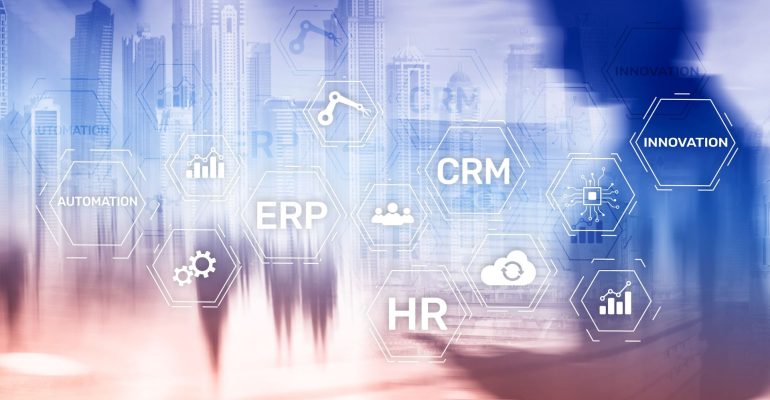The Future of ERP: Emerging Features and Trends
In the rapidly evolving landscape of business technology, Enterprise Resource Planning (ERP) systems continue to play a pivotal role in driving efficiency, innovation, and growth for organizations of all sizes. As we look ahead, the future of ERP is characterized by emerging features and trends that are reshaping the way businesses operate and compete in an increasingly digital world. In this blog, we’ll explore these exciting developments and their implications for the future of ERP.
1. AI-Powered Automation:
Artificial Intelligence (AI) is revolutionizing ERP systems by enabling intelligent automation of routine tasks, decision-making processes, and predictive analytics. AI-powered ERP can analyze vast amounts of data, identify patterns, and make recommendations to optimize operations, enhance customer experiences, and drive strategic decision-making.
2. IoT Integration:
The Internet of Things (IoT) is transforming ERP systems by enabling seamless integration with connected devices, sensors, and machinery. IoT-enabled ERP provides real-time visibility into operations, asset tracking, predictive maintenance, and supply chain optimization. This integration enhances efficiency, reduces downtime, and enables proactive decision-making based on real-time data insights.
3. Blockchain Technology:
Blockchain technology is revolutionizing ERP systems by enhancing security, transparency, and trust in transactions and data exchange. Blockchain-enabled ERP ensures data integrity, authenticity, and traceability across the supply chain, financial transactions, and regulatory compliance. This technology streamlines processes, reduces fraud, and fosters trust among stakeholders.
4. Cloud-Based Deployment:
Cloud-based ERP deployment continues to gain traction as organizations seek scalability, flexibility, and cost-effectiveness. Cloud ERP offers anytime, anywhere access to data and applications, seamless integration with other cloud services, automatic updates, and scalability to meet evolving business needs. This deployment model accelerates implementation, reduces IT infrastructure costs, and enables rapid innovation.
5. Mobile Accessibility:
Mobile accessibility is becoming increasingly essential in ERP systems, enabling users to access critical information and perform tasks on the go. Mobile ERP apps provide real-time insights, approvals, and collaboration tools, empowering employees to stay connected and productive from anywhere, at any time. Mobile ERP enhances flexibility, agility, and responsiveness in a fast-paced business environment.
6. Enhanced Analytics and Business Intelligence:
ERP systems are evolving to provide enhanced analytics and business intelligence capabilities, enabling organizations to derive actionable insights from vast amounts of data. Advanced analytics tools, predictive modelling, and machine learning algorithms empower businesses to identify trends, anticipate customer needs, optimize processes, and drive innovation.
7. Personalization and Customization:
The future of ERP is focused on personalization and customization to meet the unique needs of different industries, businesses, and users. ERP systems offer configurable interfaces, modular architectures, and industry-specific functionalities to adapt to evolving business requirements. This flexibility enables organizations to tailor ERP solutions to their specific workflows, processes, and preferences.
8. Cybersecurity and Data Privacy:
As cyber threats continue to evolve, cybersecurity and data privacy are paramount considerations for future ERP systems. Enhanced security features, encryption protocols, and compliance with data protection regulations ensure the integrity, confidentiality, and availability of sensitive information. ERP systems must prioritize cybersecurity to safeguard against data breaches, ransomware attacks, and other security threats.
9. Sustainability and Environmental Responsibility:
The future of ERP includes a focus on sustainability and environmental responsibility, with features to track and optimize resource consumption, energy efficiency, and carbon emissions. ERP systems enable organizations to measure, monitor, and reduce their environmental footprint, comply with sustainability regulations, and contribute to corporate social responsibility initiatives.
10. Digital Twins and Virtualization:
Digital twins and virtualization technologies are revolutionizing ERP systems by creating digital replicas of physical assets, processes, and environments. Digital twins enable simulation, visualization, and analysis of real-world scenarios, empowering organizations to optimize operations, improve decision-making, and drive innovation in a virtual environment.
Conclusion:
As we look to the future, ERP systems will continue to evolve and adapt to the changing needs and challenges of businesses. Emerging features and trends such as AI-powered automation, IoT integration, blockchain technology, and cloud-based deployment are reshaping the future of ERP, enabling organizations to achieve greater efficiency, agility, and competitiveness in an increasingly digital and interconnected world.
In conclusion, the future of ERP is characterized by innovation, integration, and intelligence, empowering organizations to navigate the complexities of the modern business landscape and drive sustainable growth and success.






